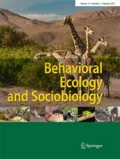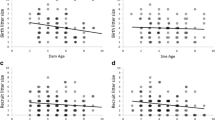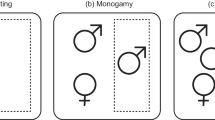Abstract
Mating young can cause early death due to resulting energetic depletion, physical damage, or sexually transmitted disease, whereas waiting too long to mate has the risks of suffering reproductive senescence or death before finding a mate. The ideal age for reproducing also depends on the mate’s age, as young partners may be more aggressive or less fertile and experienced than mature partners. Therefore, longevity and lifetime reproductive success depend on the combination rather than the individual effects of self- and the mate’s mating age, but this idea has not been formally explored. Here I evaluated lifetime reproductive success and longevity in males and females mated at different ages (i.e., young or mature) with mates of the same or a different age. As a study system, I used the horned dung beetle Euoniticellus intermedius, a classic study subject with intense sexual selection for male horn size, which is a reliable indicator of male strength and condition. For both males and females, mating young severely reduced lifespan, independent of the mate’s age, body, or male horn size. Due to reduced survival, females, but not males, had fewer offspring, with a stronger fitness effect suffered by mature than by young females. Regarding reproductive success, mature males and females had 3.4 and 1.6 times more offspring, respectively, when mated with mature than when mated with young partners, independently of their own body and horn sizes. Reproductive success of young males or females was not sensitive to the mate’s age. These results indicate that the optimal onset of reproduction and the ideal reproductive investment are highly dependent on the combination of self- and the mate’s age.
Significance statement
A very important decision in life is when to mate for the first time. Whereas mating too young can be risky or suboptimal, waiting too long increases the chance of dying before finding a mate. Here I show that in dung beetles, it can be equally important to choose the correct mate’s age in order to maximize lifetime reproduction. The most dramatic decision is for individuals (mainly males) that take a long time to mate, whose fitness get reduced by up to three times when mated with young rather than mature couples. This idea had never been tested in animals, and dung beetles showed that a combination of self- and the mate’s age will be determinant of how much progeny can animals have and how deadly it can be to take maladaptive decisions.




Similar content being viewed by others
Data availability
Data are provided as supplementary material.
References
Araya-Ajoy AYG, Bolstad GH, Brommer J et al (2018) Demographic measures of an individual’s “pace of life”: fecundity rate, lifespan, generation time, or a composite variable? Behav Ecol 72:1–14
Avila FW, Sirot LK, LaFlamme BA et al (2011) Insect seminal fluid proteins: identification and function. Annu Rev Entomol 56:21–40. https://doi.org/10.1146/annurev-ento-120709-144823
Baena-Díaz F, Martínez-M I, Gil-Pérez Y, González-Tokman D (2018) Trans-generational effects of ivermectin exposure in dung beetles. Chemosphere 202:637–643. https://doi.org/10.1016/j.chemosphere.2018.03.109
Bates DM, Maechler M, Bolker B, Walker S (2015) Fitting linear mixed-effects models using lme4. J Stat Softw 67:1–48. https://doi.org/10.1177/009286150103500418
Beck CW, Promislow DEL (2007) Evolution of female preference for younger males. PLoS ONE 2:1–8. https://doi.org/10.1371/journal.pone.0000939
Blanckenhorn WU (2000) The evolution of body size: what keeps organisms small? Q Rev Biol 75:385–407. https://doi.org/10.1086/393620
Blume RR (1984) Euoniticellus intermedius (Coleoptera: Scarabaeidae): description of adults and immatures and biology of adults. Environ Entomol 13(4):1064–1068
Bock M, Jarvis G, Corey E et al (2019) Maternal age alters offspring lifespan, fitness, and lifespan extension under caloric restriction. Sci Rep 9:3138
Clutton-Brock T (1984) Reproductive effort and terminal investment in iteroparous animals. Am Nat 123:212–229
Córdoba-Aguilar A, González-Tokman DM (2011) Male harassment and female energetics in the territorial damselfly Hetaerina americana (Fabricius) (Zygoptera: Calopterygidae). Odonatologica 40:1–15
Crean AJ, Bonduriansky R (2014) What is a paternal effect? Trends Ecol Evol 29:554–559. https://doi.org/10.1016/j.tree.2014.07.009
Culina A, Linton DM, Pradel R et al (2019) Live fast, don’t die young: survival–reproduction trade-offs in long-lived income breeders. J Anim Ecol 88:746–756. https://doi.org/10.1111/1365-2656.12957
Dhillon MK, Tanwar AK, Hasan F (2019) Fitness consequences of delayed mating on reproductive performance of Chilo partellus (Swinhoe). J Exp Zool Part A Ecol Integr Physiol 331:161–167. https://doi.org/10.1002/jez.2249
Dhole S, Pfennig KS (2014) Age-dependent male mating investment in Drosophila pseudoobscura. PLoS ONE 9. https://doi.org/10.1371/journal.pone.0088700
Fox CW (1993) Multiple mating, lifetime fecundity and female mortality of the bruchid beetle, Callosobruchus maculatus (Coleoptera: Bruchidae). Funct Ecol 7:203. https://doi.org/10.2307/2389888
Fox J, Weisberg S (2018) An R companion to applied regression. Sage Publications
Fricke C, Maklakov AA (2007) Male age does not affect female fitness in a polyandrous beetle, Callosobruchus maculatus. Anim Behav 74:541–548. https://doi.org/10.1016/j.anbehav.2006.12.016
González-Tokman D, González-Santoyo I, Munguía-Steyer R, Córdoba-Aguilar A (2013) Effect of juvenile hormone on senescence in males with terminal investment. J Evol Biol 26. https://doi.org/10.1111/jeb.12241
González-Tokman D, Martínez MI, Villalobos-Ávalos Y et al (2017) Ivermectin alters reproductive success, body condition and sexual trait expression in dung beetles. Chemosphere 178:129–135. https://doi.org/10.1016/j.chemosphere.2017.03.013
Harris WE, Uller T (2009) Reproductive investment when mate quality varies: differential allocation versus reproductive compensation. Philos Trans R Soc B Biol Sci 364:1039–1048. https://doi.org/10.1098/rstb.2008.0299
Harvey PH, Zammuto RM (1985) Patterns of mortality and age at first reproduction in natural populations of mammals. Nature 315:319–320
Hill G (1991) Plumage coloration is a sexually selected indicator of male quality. Nature 350:337–339
Khokhlova IS, Pilosof S, Fielden LJ et al (2014) A trade-off between quantity and quality of offspring in haematophagous ectoparasites: the effect of the level of specialization. J Anim Ecol 83:397–405. https://doi.org/10.1111/1365-2656.12134
Kirkwood TBL (2002) Evolution of ageing. Mech Ageing Dev 123:737–745
Koch LK, Meunier J (2014) Mother and offspring fitness in an insect with maternal care: phenotypic trade-offs between egg number, egg mass and egg care. BMC Evol Biol 14:1–9. https://doi.org/10.1186/1471-2148-14-125
Kokko H, Lindstrom J (1996) Evolution of female preference for old mates. Proc R Soc B Biol Sci 263:1533–1538. https://doi.org/10.1098/rspb.1996.0224
Kotiaho JS, Simmons LW, Hunt J, Tomkins JL (2003) Males influence maternal effects that promote sexual selection: a quantitative genetic experiment with dung beetles Onthophagus taurus. Am Nat 161:852–859. https://doi.org/10.1086/375173
Kuznetsova A, Christensen RHB, Bavay C, Brockhoff PB (2015) Automated mixed ANOVA modeling of sensory and consumer data. Food Qual Prefer 40:31–38. https://doi.org/10.1016/j.foodqual.2014.08.004
Lailvaux SP, Hathway J, Pomfret J, Knell RJ (2005) Horn size predicts physical performance in the beetle Euoniticellus intermedius (Coleoptera: Scarabaeidae). Funct Ecol 19:632–639. https://doi.org/10.1111/j.1365-2435.2005.01024.x
Liu XP, He HM, Sen XF (2014) The influence of female age on male mating preference and reproductive success in cabbage beetle, Colaphellus bowringi. Insect Sci 21:515–522. https://doi.org/10.1111/1744-7917.12051
Martínez IM, Martínez Diego AK, Cano BM, Lumaret JP (2019) The reproductive biology of Euoniticellus intermedius (Reiche) (Coleoptera: Scarabaeinae: Oniticellini). Proc Entomol Soc Washingt 121:642–656. https://doi.org/10.4289/0013-8797.121.4.642
McNamara JM, Houston AI, Barta Z et al (2009) Deterioration, death and the evolution of reproductive restraint in late life. Proc R Soc B Biol Sci 276:4061–4066. https://doi.org/10.1098/rspb.2009.0959
Metcalfe NB, Monaghan P (2001) Compensation for a bad start: grow now, pay later. Trends Ecol Evol 16:254–260
Mourocq E, Bize P, Bouwhuis S et al (2016) Life span and reproductive cost explain interspecific variation in the optimal onset of reproduction. Evolution (N Y) 70:296–313. https://doi.org/10.1111/evo.12853
Olzer R, Ehrlich R, Heinen-Kay J et al (2018) Reproductive behavior. Insect behavior. Oxford University Press, Oxford, pp 189–202
Pérez-Staples D, Martínez-Hernández MG, Aluja M (2010) Male age and experience increases mating success but not female fitness in the mexican fruit fly. Ethology 116:778–786. https://doi.org/10.1111/j.1439-0310.2010.01790.x
Pomfret JC, Knell RJ (2006a) Sexual selection and horn allometry in the dung beetle Euoniticellus intermedius. Anim Behav 71:567–576. https://doi.org/10.1016/j.anbehav.2005.05.023
Pomfret JC, Knell RJ (2006b) Immunity and the expression of a secondary sexual trait in a horned beetle. Behav Ecol 17:466–472. https://doi.org/10.1093/beheco/arj050
Preston BT, Saint Jalme M, Hingrat Y et al (2015) The sperm of aging male bustards retards their offspring’s development. Nat Commun 6:1–9. https://doi.org/10.1038/ncomms7146
Proshold FI (1996) Reproductive capacity of laboratory-reared gypsy moths (Lepidoptera: Lymantriidae): Effect of age of female at time of mating. J Econ Entomol 89:337–342. https://doi.org/10.1093/jee/89.2.337
R Development Core Team (2021) R: a language and environment for statistical computing. R Foundation for Statistical Computing, Austria
Reaney LT, Knell RJ (2010) Immune activation but not male quality affects female current reproductive investment in a dung beetle. Behav Ecol 21:1367–1372. https://doi.org/10.1093/beheco/arq139
Reinhardt K, Naylor RA, Siva-Jothy MT (2009) Ejaculate components delay reproductive senescence while elevating female reproductive rate in an insect. Proc Natl Acad Sci 106:21743–21747. https://doi.org/10.1073/pnas.0905347106
Robinson MR, Pilkington JG, Clutton-Brock TH et al (2006) Live fast, die young: trade-offs between fitness components and sexually antagonistic selection on weaponry in soay sheep. Evolution (N Y) 60:2168. https://doi.org/10.1554/06-128.1
Rodríguez-Muñoz R, Hopwood P, Fisher D et al (2019) Older males attract more females but get fewer matings in a wild field cricket. Anim Behav 153:1–14. https://doi.org/10.1016/j.anbehav.2019.04.011
Rodríguez-Muñoz R, Bretman A, Slate J, et al (2010) Natural and sexual selection in a wild insect population. Science (80- ) 328:1269–1272. https://doi.org/10.1126/science.1188102
Roff D (1992) The evolution of life histories: theory and analysis. Chapman & Hal, New York
Ruhmann H, Koppik M, Wolfner MF, Fricke C (2018) The impact of ageing on male reproductive success in Drosophila melanogaster. Exp Gerontol 103:1–10. https://doi.org/10.1016/j.exger.2017.12.013
Sheldon BC (2000) Differential allocation: tests, mechanisms and implications. Trends Ecol Evol 15:397–402. https://doi.org/10.1016/S0169-5347(00)01953-4
Simonsohn U (2018) Two lines: a valid alternative to the invalid testing of U-shaped relationships with quadratic regressions. Adv Methods Pract Psychol Sci 1:538–555. https://doi.org/10.1177/2515245918805755
Stahlschmidt ZR, Adamo SA (2015) Food-limited mothers favour offspring quality over offspring number: a principal components approach. Funct Ecol 29:88–95. https://doi.org/10.1111/1365-2435.12287
Therneau TM, Grambsch PM (2000) The Cox model. Modeling survival data: extending the Cox model. Springer, New York, pp 39–77
Travers LM, Garcia-Gonzalez F, Simmons LW (2015) Live fast die young life history in females: evolutionary trade-off between early life mating and lifespan in female Drosophila melanogaster. Sci Rep 5:1–7. https://doi.org/10.1038/srep15469
Unnithan GC, Paye SO (1991) Mating, longevity, fecundity, and egg fertility of Chilo partellus (Lepidoptera: Pyralidae): effects of delayed or successive matings and their relevance to pheromonal control methods. Environ Entomol 20:150–155. https://doi.org/10.1093/ee/20.1.150
Venables WN, Ripley BD (2002) Random and mixed effects. In Modern applied statistics with S. Springer, New York, pp 271–300
Webberley KM, Buszko J, Isham V, Hurst GDD (2006) Sexually transmitted disease epidemics in a natural insect population. J Anim Ecol 75:33–43. https://doi.org/10.1111/j.1365-2656.2005.01020.x
Wedell N, Ritchie MG (2004) Male age, mating status and nuptial gift quality in a bushcricket. Anim Behav 67:1059–1065. https://doi.org/10.1016/j.anbehav.2003.10.007
Wickham H (2009) Elegant graphics for data analysis. Media 35:10–1007
Xu J, Wang Q (2011) Seminal fluid reduces female longevity and stimulates egg production and sperm trigger oviposition in a moth. J Insect Physiol 57:385–390. https://doi.org/10.1016/j.jinsphys.2010.12.006
Zera AJ, Harshman LG (2001) The physiology of life history trade-offs in animals. Annu Rev Ecol Syst 32:95–126
Zhao CC, Zheng HY, Ma C et al (2017) Effects of age at mating of both sexes on female longevity and fecundity performance in Ophraella communa LeSage (Coleoptera: Chrysomelidae). Biocontrol Sci Technol 27:1145–1152. https://doi.org/10.1080/09583157.2017.1387232
Zuur AF, Ieno EN, Walker NJ et al (2009) Mixed effects models and extensions in ecology with R. Springer, New York
Acknowledgements
Thanks to Francisco Caselín-Cuevas, Ana Kory Martínez-Diego, and Yorleny Gil-Pérez for their help in the laboratory. Robert Knell and an anonymous reviewer provided relevant comments to improve the manuscript.
Funding
This study was funded by CONACYT project Ciencia Básica number 257894.
Author information
Authors and Affiliations
Corresponding author
Ethics declarations
Competing interests
The author declares no competing interests.
Additional information
Publisher's note
Springer Nature remains neutral with regard to jurisdictional claims in published maps and institutional affiliations.
This article is a contribution to the Topical Collection Sexual Selection, Sexual Conflict and Aging - Guest Editors: Ruth Archer and David Hosken
Communicated by D. J Hosken
Supplementary Information
Below is the link to the electronic supplementary material.
Rights and permissions
About this article
Cite this article
González-Tokman, D. Effects of mating age and mate age on lifespan and reproduction in a horned beetle. Behav Ecol Sociobiol 76, 99 (2022). https://doi.org/10.1007/s00265-022-03206-5
Received:
Revised:
Accepted:
Published:
DOI: https://doi.org/10.1007/s00265-022-03206-5




